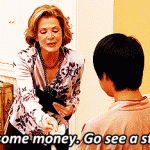If you’ve been following the ABC show Scandal, you know that it’s Grey’s Anatomy/Private Practice creator Shonda Rhimes’ latest hit, a political thriller featuring inside-the-Beltway crisis management whiz Olivia Pope. But the most fascinating aspect of the show is one that is barely mentioned: Pope, the lead character played by Kerry Washington, is black, the “first African-American female lead in a network drama in almost 40 years,” according to The New York Times. And yet in the 29 episodes of the show aired to date, the word “race” has only been uttered just twice, and rarely addressed otherwise.
From Rhimes’ point of view, this represents progress. She is known for creating shows with diverse casts (e.g., Grey’s Anatomy, in which nearly half of the main cast are people of color), yet avoiding any open discussion of that diversity, as if its existence is evidence enough that progress in the area of accepting racial differences has been made. From the The New York Times Magazine:
When people who aren’t of color create a show and they have one character of color on their show, that character spends all their time talking about the world as ‘I’m a black man blah, blah, blah.’ That’s not how the world works. I’m a black woman every day, and I’m not confused about that. I’m not worried about that. I don’t need to have a discussion with you about how I feel as a black woman, because I don’t feel disempowered as a black woman.
As one of the few consistent hitmakers left in network television, Rhimes certainly has earned the right to do or say what she wants in her shows. But I confess to be a bit disturbed that part of the appeal of Grey’s Anatomy and Scandal is that it depicts racial harmony but never the mess and challenge required to achieve it. Americans may enjoy this type of societal idealism in their weekly television escapism, but it’s as far from real life as can be.
Many times in my life, Caucasian friends have said to me, “I don’t think of you as Asian. I just think of you as Helen.” And I know they mean this to be a compliment, that somehow my personality and persona have transcended my ethnic background so that I look, essentially, colorless. But it has never felt like a compliment to hear it. Instead, it feels like a critical piece of my identity has been excised, without which I wouldn’t be myself at all. Instead of promoting a true sense of race-related understanding, this type of whitewashing merely avoids any sort of healthy discussion about racial differences.
In contrast, I can clearly remember the time in college when I felt led to start a small group Bible study specifically for Asian-American students within the InterVarsity chapter at my school. The pushback I received from the rest of the (all-Caucasian) student leaders was substantial. They did not understand why such a group was needed, or how taking this step would do anything but lead to increased friction and division in our fellowship, and the issue became the focus of intense debate and discussion for months on end.
When at last we came to the mutual, Spirit-led conclusion to allow the inclusion of the Asian-American small group, we felt a collective sense of wonder and appreciation at the reward of working through the conversation about racial differences, a topic that we had rarely discussed in the context of this Christian group before. And although it was far from the end of race-related discussions in our IVCF chapter, the fact that we had opened the door to the conversation helped increase our understanding and appreciation for racial differences far more than if we had just glossed over those differences.
For just a moment while watching Scandal, during the very last episode of this past season, I thought, “Wow — they finally are tackling the race issue!” The Caucasian president of the United States (played by Tony Goldwyn), who is romantically involved with Olivia Pope, makes this statement:
My relationship with Olivia is going to push a real dialogue about race in this country and it is going to blow the Republican party wide open and let some light and air into places that haven’t seen change for far too long.
(Spoiler alert! Don’t read further if you haven’t seen the season finale of Scandal.)
However, my excitement that the show could use this opportunity to truly open that real race-related dialogue was short-lived. Twenty minutes later, by the episode’s end, the POTUS and Olivia have retreated from pursuing the relationship any further, and no such dialogue appears to be on the horizon. The scandal of Scandal is that it could do so much more to spark discussions about racial differences, but instead it chooses to color the show in shades that all blur everyone together to look the same.















